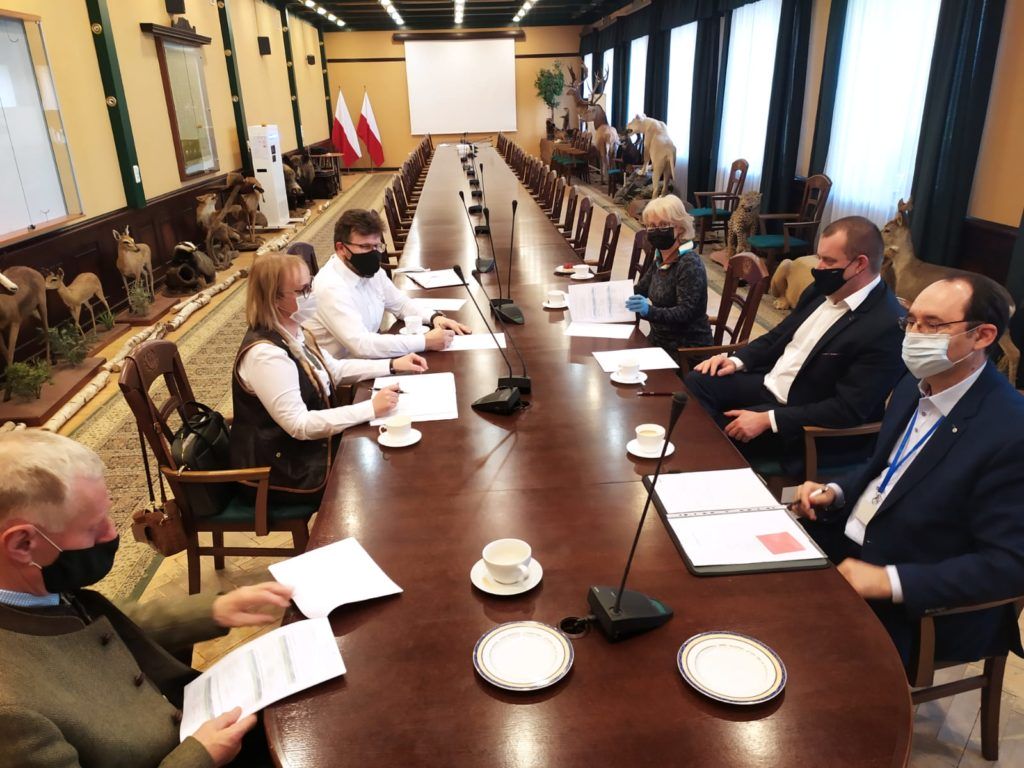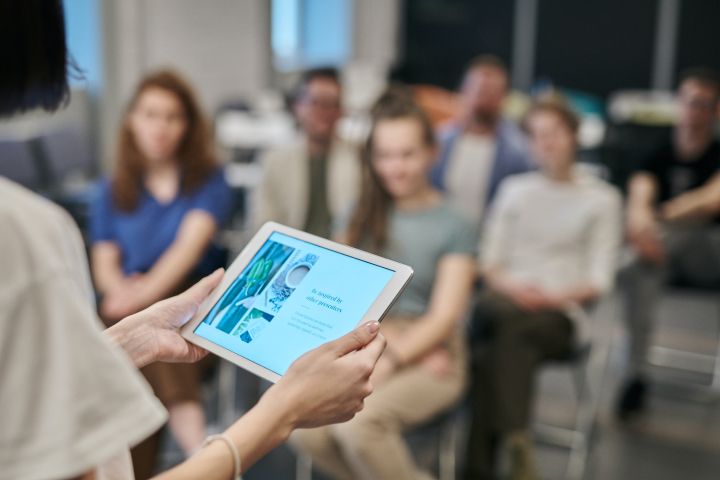SUMMARY OF THE IMPACT DESCRIPTION
The research conducted by the Academy’s staff, as well as the experience in the use of distance learning, represent a potential which is used in practice for the benefit of the activities of other entities and to improve the professional qualifications of Prison Service officers in Poland. The variety of activities undertaken in response to the needs of the prison environment and other uniformed services has a significant impact on the quality of the training provided and the statutory tasks for which the entities have been established. The scientific activity of the Academy in the field of improving competences using modern technologies is also a response to the current epidemic situation, which has affected many areas of life, including education or the acquisition of necessary qualifications through non-formal and informal education. It is also part of the European Commission’s efforts to open up lifelong learning opportunities to citizens both in the context of higher education and vocational education and training through implementing microcredentials.
CHARACTERISTICS OF THE MAIN RESEARCH FINDINGS
The results of research carried out under the Pilot Penitentiary Complexes – Module II Modernisation of the training system for Prison Service personnel project, financed by the Norwegian Financial Mechanism 2014–2021 and the “Sprawiedliwość” Programme indicated deficit areas, i.e. competence gaps among Prison Service officers. The results obtained have helped to develop innovative postgraduate programmes in the field of Penitentiary Studies for candidates for Prison Service officers and Management of organisational units for Prison Service officers. They also contributed to the creation of other forms of professional development. After analysing the conclusions of qualitative and quantitative research on PS officers’ attitudes and competences important in the performance of official tasks, the changes to the programme included an increase in the number of practical classes aimed at the development of intrapersonal and intrapsychic skills, by introducing a block called Penitentiary Prevention. In the course of the classes, the participants increase their awareness of their communication skills and their influence on shaping their relations with others, including inmates of penitentiary units, learn to recognise the emotions of those around them and their own inner states in order to improve their assertive speaking skills. They also gain knowledge and experience in recognising crisis situations and appropriate responses (communication, negotiation or intervention) depending on the dynamics of the situation and the threat assessment. The classes are designed to integrate knowledge from various fields – security (including dynamic defence), re-socialisation and psychology. Innovative elements, i.e. penitentiary law and pragmatics, penitentiary science and security, were introduced in the blocks programme. The thematic scope of the indicated blocks reflects the need to build knowledge about the rights of officers and the possibilities of their enforcement, and increases self-awareness and knowledge of the place of the Prison Service in meeting the needs of national and personal security. The programme also refers to building healthy habits to help officers develop a healthy working environment and appropriate attitudes with both inmates and co-workers. Effective learning methods were introduced into the programme. As a result, learning games are being implemented, interactive learning materials have been developed and more workshop activities and interactive exercises have been introduced.
Distance learning strengthens cooperation between uniformed services

CHARACTERISTICS OF THE ROLI OF THE ENTITY IN ACHIEVING THE SCIENTIFIC ACTIVITY EFF
The Chair of Andragogy and Pedagogy of Labour at the Institute of Social Foundations of Penitentiary of the Academy of Justice headed by prof. dr. Jakub Czarkowski (Prof., PhD) conducts R&I activities in the field of the use of distance learning in the complementary education of prison staff and other uniformed formations personnel. Within this Chair, Gen. Dr. Marcin Strzelec (Gen. PhD), based on his knowledge and experience, initiated in 2013 the Uniformed Services Education Forum which formalises the cooperation established between training centres of the Polish uniformed services regarding the organisation and methodology of education. Of key importance is the Pilot Penitentiary Complexes – Module II Modernisation of the training system for Prison Service personnel project implemented by Gen. Dr. Marcin Strzelec resulting in a reduction in the rate of prisoners’ return to crime by raising the competences of Prison Service staff within a modernised system of education and in-service training, supporting the process of re-socialisation and readaptation of prisoners.
History of origin
The establishment of the Uniformed Services Education Forum formalised cooperation that had been established between training centres of the Polish uniformed services in the field of organisation and methodology of education. It took place during the “New Technologies in Education of Uniformed Services” Conference, which was held in 2012 at the Central Prison Service Training Centre in Kalisz.
During the several years of the FESM’s operation, several meetings were held with the aim, among other things, of seeking common methodological solutions for conducting trainings. Thanks to the established contacts, the partners enriched the range of tools used with new functionalities.
The turning point that intensified the scope of collaboration was the outbreak of pandemic, during which each of the institutions established for education faced numerous organisational challenges.
In March 2021, at the initiative of the Academy, a meeting titled “Distance Learning – Exchange of Good Practices” was held, during which invited guests on behalf of the Signatories of the Forum exchanged experiences that resulted from a year-long change in the current patterns of operation.
As part of exploring the topic of distance learning in FESM member institutions, representatives were invited to take part in a survey to find out how institutions reacted to the pandemic situation in terms of distance learning solutions in place.
Signatories
Initially, 11 institutions responsible for the training of uniformed services personnel joined FESM, formations: police, army, fire brigade, border guards, etc. Currently, 14 institutions belong to FESM:

Signatories
– Akademia Sztuki Wojennej,
– Akademia Wojsk Lądowych,
– Centralna Szkoła Państwowej Straży Pożarnej,
– Centralny Ośrodek Szkolenia Służby Więziennej w Kulach,
– Centralny Ośrodek Szkolenia Straży Granicznej,
– Centrum Szkolenia Policji,
– Centrum Szkolenia Straży Granicznej,
– Ministerstwo Finansów Krajowa Szkoła Skarbowości,
– Ośrodek Szkoleń Specjalistycznych Straży Granicznej,
– Szkoła Główna Służby Pożarniczej,
– Szkoła Policji w Katowicach,
– Szkoła Wyższa Wymiaru Sprawiedliwości,
– Wojskowa Akademia Techniczna,
– Wyższa Szkoła Policji w Szczytnie.
Principal investigator and research team
Evidence of the contribution of scientific activities
Numerous scientific articles and monographs published by university employees, participation in scientific conferences and affiliation with entities promoting distance learning constitute unquestionable evidence of scientific activities.
On 6-7 May 2021, representatives of the Academy participated in an international conference titled
„Modernising EU justice systems by boosting training of justice professionals” organised in the framework of the Portuguese Presidency of the Council of the European Union
The objectives of the conference included:
– disseminate the new European judicial training strategy 2021-2024,
– present the Council conclusions ‘Boosting training of justice professionals’,
– explain, promote and discuss the strategy’s new quantitative and qualitative priorities.
More information: Conference EU Judicial Training
Bibliographic description and summary of scientific achievements
CHARACTERISTICS OF THE IMPACT OF SCIENTIFIC ACTIVITIES, INCLUDING THE ONES THE RESULTS OF WHICH ARE SUBJECT TO COMMERCIALISATION, INDICATING THE RELATIONSHIP BETWEEN THE SCIENTIFIC ACTIVITY AND THAT IMPACT AND THE SOCIAL GROUP BENEFICIARY OF THAT IMPACT AND THE AREA ON WHICH THE SCIENTIFIC ACTIVITY HAS THE MOST IMPACT
The experience gained so far by the representatives of the academy in the field of distance learning have resulted in the implementation of innovative solutions in the institutions benefiting from the support of the Academy of Justice. Representatives of the academy repeatedly share their experience and knowledge with officers of various uniformed formations and representatives of training centres. Meetings within the Uniformed Services Educational Forum contribute to the exchange of experiences valuable due to the similarity in the functioning of hierarchical units. Different perspectives on the same view, in this case on the dependencies and conditions of uniformed formations, is important in training. The trainings initiated increase participants’ awareness of opportunities, often translating into institutional cooperation in a narrower circle. The solutions applied by a given centre or university often lead other participants to verify their solutions, prompting them to modify them.
An important social group for which representatives of the Academy of Justice have taken innovative action are hunters from the Polish Hunting Association. As part of the cooperation undertaken, the academy supported this entity in initiating activities aimed at popularising remote learning among hunters. This is a solution that has not been used by the organisation so far. Training and Educational Platform of the Polish Hunting Association (www.moodle.pzlow.pl), i.e. tools for conducting online training and courses in the Polish Hunting Association, was implemented. Several thousand hunters participate in basic and extended online courses every year. The courses available on the platform allow candidates to prepare for exams enabling them to gain membership in hunting structures, and help hunters to gain the knowledge necessary to obtain culling license. In addition, members of the Polish Hunting Association were offered courses in first aid.
Since 2020, a modernisation of the training system for Prison Service personnel has been carried out, which helped to reduce the prisoners recidivism rate by reorganising the teaching system through the use of the potential of the Academy of Justice. Direct actions to achieve the results were carried out through the offer of courses carried out as part of external in-service training and postgraduate studies. Each form of education has been developed based on the academy’s research findings. The experience of the Norwegian partners has also been used in the development of the programmes. Thanks to a thorough survey of more than 1,000 officers, the competences that need strengthening were identified. In addition to the training or study programmes, the way in which classes are run has also been modified, focusing primarily on practical aspects. This means that during the course students and trainees have the opportunity to apply the acquired knowledge in real prison situations. They also receive ongoing feedback on their progress in acquiring skills. The structure of the classes influences the participant’s perception of the penitentiary unit not only from the perspective of his/her post or department, but as a whole in which specific tasks influence the functioning of the others. Another important change in the study programmes is that participants are given the opportunity to take on different roles during the course, and the reflection taken allows for a broader understanding of the decisions taken.
Distance learning, ensuring permanent access to up-to-date knowledge, is also used in the course of improving the competences of Prison Service officers. It is related to the concept of blended model of in-service training and education of Prison Service officers, created on the basis of the concept of blended learning. In its essence, this concept retains the values of traditional forms of education while making creative use of what modern technology, in particular computer technology and the Internet, offers to education.
Each of the implemented changes corresponds to actions of the European Commission aimed at the dissemination of microcredentials. Their acquisition is based on the individual needs of learners, in the case of distance learning at a pace adapted to the recipient, without the need for constant third-party supervision.
The modern approach to the acquisition of microcredentials offers the possibility of a coherent and purposeful presentation of learning outcomes acquired in the formal system, while at the same time providing flexibility in the choice of time and place of the training, which is highly valued by adults.
Online courses: the “Debata” [Debate] or “Korekta dla osadzonych” [Correction for inmates] programme initiated by prof. K. Wojcieszek, which deal with alcohol prevention, contribute to raising awareness in this area among young people, Prison Service officers and, ultimately, people deprived of their liberty. Course content is important in shaping the attitudes of its beneficiaries.
The Academy of Justice provides support in the form of:
- assistance in the launch of platforms for distance learning;
- technical and methodological trainings for lecturers;
- consultations on methodological solutions.
Characteristics of social impact
| The experience gained so far by the representatives of the academy in the field of distance learning have resulted in the implementation of innovative solutions in the institutions benefiting from the support of the Academy of Justice. It is also a stimulus to independently search for new possibilities of development of this area of training and education. |
| Organisation of distance learning in the Polish Hunting Association |
As part of its cooperation with the Polish Hunting Association, the Academy of Justice supports the entity in initiating activities aimed at promoting distance learning among hunters. This is a solution that has not been used by the organisation so far. It is assumed that the incorporation of tools of complementary education will contribute to the promotion of this method of acquiring knowledge among enthusiasts of the Polish Hunting Association.
Letter of gratitude of the Chief of the Border Guard Centre for Specialised Training in Lubań for the online workshops conducted for the Centre’s staff.
More information:Distance learning in the training of uniformed services – an on-line workshop for the staff of the Border Guard Centre for Specialised Training in Lubań



SCOPE OF THE IMPACT
Regionalny
IMPORTANCE OF THE IMPACT
Istotne
Further information
The research described above have furthermore contributed to:
- strengthening of social ties,
- increase of public awareness,
- a change of mindset,
- increased access for those who have so far been excluded,
- deepening the knowledge provided,
- increased involvement of local, central authorities,
- translation into national legislation.


